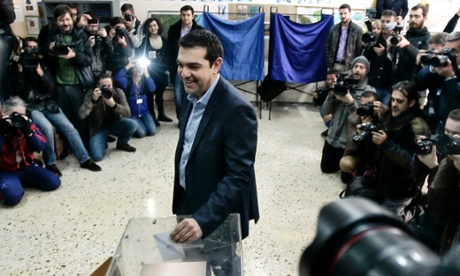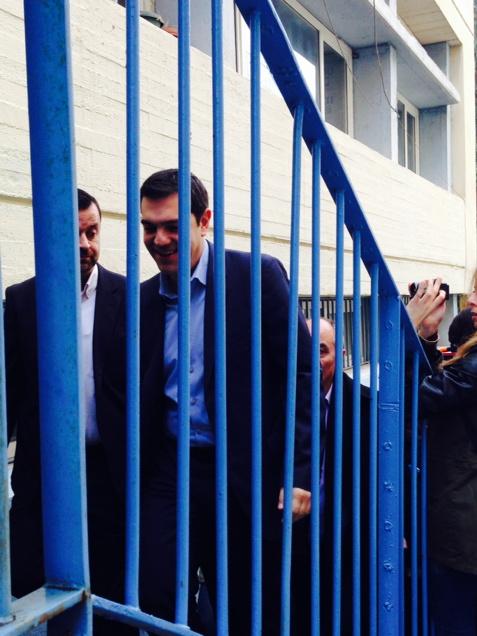Alexis Tsipras’s leftwing party finish eight points clear of the
incumbent conservatives, New Democracy
- Jon Henley in Athens
- The Guardian, Monday
26 January 2015
- Jump to comments (1698)

Radical leftists Syriza, led by Alexis Tsipras, promise to renegotiate
the international bailout that imposed austerity on Greece. Photograph:
Milos Bicanski/Getty Images
Syriza, the radical leftists who have pledged to roll back austerity and
renegotiate Greece’s mammoth debt, swept to a stunning victory in the country’s
elections on Sunday – but looked like falling agonisingly short of an outright
majority.
With more than 90% of the results in, official interior ministry results
put Alexis Tsipras’s party on 36%, eight points clear of their chief rivals,
the conservative New Democracy of outgoing prime minister Antonis Samaras, on
28%.
But even with the 50-seat bonus awarded to the winning party, that translated to
149 seats – two less than Syriza needs to govern alone in the 300-seat
parliament. The extreme-right, anti-immigrant, Nazi-inspired Golden Dawn,
several of whose 18 MPs are in jail awaiting trial for membership of a criminal
organisation, clinched third place ahead of the new, centrist To Potami party.
In front of an ecstatic crowd of cheering, flag-waving supporters
outside Athens university, Tsipras said that “today, the Greek people have made
history. Hope has made history.”
The Greek people, he said, had “given a clear, strong, indisputable
mandate. Greece has turned a page. Greece is leaving behind destructive
austerity, fear and authoritarianism. It is leaving behind five years of
humiliation and pain.”
Tsipras, 40, will lead the first eurozone government to openly oppose
bailout conditions imposed by the European Union and International Monetary
Fund, seemingly setting Athens on a collision course with Brussels and
particularly Berlin. The result had “made the Troika [the EU, IMF and European
Central Bank] history,” he said.
Criticism was not slow in coming. The president of Germany’s Bundesbank,
Jens Weidmann, said Greece should stick to its budget commitments. “I hope the
new government won’t call into question what is expected and what has already
been achieved,” he told ARD television.
After five brutal years of austerity and recession, Greece’s 9.8m voters
went to the polls under clear skies. Looking confident and relaxed, Tsipras
cast his ballot in a primary school in the Kipseli district of Athens, saying
the day represented the Greek people’s “last step towards regaining our
dignity”.
Voters there said the poll felt like the most important in Greece’s
recent history. “I just voted for the party that’s going to change Greece – in
fact, the party that is going to change the whole of Europe,” said Panagiotis,
54, a self-employed electrician.
“There has to be change, big change. The economy has collapsed. Poverty
has reached proportions … People, ordinary people like you and me, are poking
around in dustbins to get food to eat. The young can only find work abroad.
Syriza is Greece’s hope.”
Phoebe Greenwood talks to Greeks before a high-stakes election in the
country.
Maria, 78, a lifelong conservative, said she had voted Syriza for the
first time because she had “no confidence left in anyone, any party, who has
governed us up until now”.
She added: “Things are in a very bad way here. But at least Syriza seem
to care. My grandson – he’s seven – said to his mother, just now: ‘Vote
Tsipras, mummy. He talks about the poor people.’”
Samaras appeared on national television to concede defeat, saying he had
“assumed charge of a country that was on the brink of collapse … and restored
its international credibility.” But he said the Greek people had spoken and the
country must respect their decision.
Tsipras’s fierce anti-austerity, anti-bailout message has found an
enthusiastic audience across a now visibly strung-out and worn-down country.
Since 2009, Greece’s GDP has plummeted by a quarter and its household income by
more than a third, while joblessness has trebled, to 26%.
Swingeing spending cuts and soaring unemployment have seen about 3.1
million people, or a third of the population, lose their social security and
health insurance, leaving the country on the brink of humanitarian crisis.
Almost third of Greece’s population now lives below the poverty line, while 18%
are unable to afford basic food needs.

The Syriza party’s poster reads ‘the hope is coming’ in an election
campaign kiosk in Athens. Photograph: Angelos Tzortzinis /AFP/Getty Images
If Syriza does need a coalition partner, its choices are limited. Golden
Dawn is clearly not an option and the Communist party has refused all
cooperation with Syriza. Possible allies could include To Potami, whose leader
said he was willing to talk, or the populist Independent Greeks, who agree with
Syriza that austerity has to end, but disagree on almost everything else.
Neither alliance would be easy.
The prospect of a Syriza victory spooked creditors who worry that Athens
will seek a write-off of at least part of its €320bn debt. Some analysts fear
that a tough Syriza approach to negotiations could push Greece out of the
eurozone, although Germany’s chancellor, Angela Merkel, insisted on Friday that
this was not what she wanted.
Tsipras’s line has softened markedly in recent weeks, but several EU
capitals are still alarmed by promises to cancel the most draconian budget cuts
imposed as part of the country’s €240bn bailout package.
“We will start with the things we can easily do, that we can afford, but
will make a difference,” said Gabriel Sakellaridis, a young Syriza candidate in
central Athens.
“We don’t have a magic wand; people know that. But we can take simple
steps to restore some social justice: raise the minimum wage and pension,
abolish the most unfair new taxes.”
Above all, he said, Syriza could “restore the hope that has been missing
from the Greek people through the past five years of fear, anxiety, despair.
Syriza has convinced them we not just that we want to change things, but that
we can.”









No comments:
Post a Comment